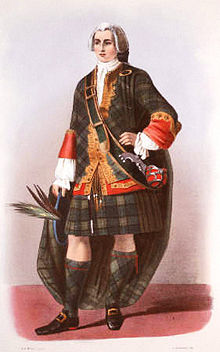Clan chief

Clan Chief or Clan-chief (from Scottish Gaelic clann "children", and English chief "chief, chief ": clan chief ) denotes the representative of the founding father and representative of a Scottish clan . In Scotland , clan members have long believed that they descended from a common ancestor , the founder and mostly namesake of their clan .
In the Scottish clan system, the incumbent Chief is superior to the Chief of a Chieftain . As a result, a branch chief (head of a clan branch) is the intended successor to a chieftain. Clans without their own chief are called Armigerous Clan .
Duties of the clan chief
Originally, the chief's main task was to lead his clan in fighting on land and sea. In the Scottish Highlands , the chief and the chieftain were once influential political figures who wielded great, but often arbitrary, authority. This is no longer the case today, the titles Chief or Chieftain only have a high social significance. Their existence was recognized by Scottish law , however the disarmament of the Highland clans after the Jacobite Rising of 1745 resulted in the Chiefs' retirement from civil and legal law . The most notable law was the Heritable Jurisdictions Act 1746 , which abolished the traditional rights of jurisdiction that Clan Chiefs had until then.
See also
- Clan mother (for North American Indians)
- Chief (political leader)
literature
- Frank Adam, Thomas Innes of Learney: The Clans, Septs & Regiments of the Scottish Highlands. 8th edition. Johnston and Bacon, Edinburgh 1970 (English).
- Colin Mark: The Gaelic-English Dictionary. At the Faclair Gàidhlig-Beurla. Routledge, 2003, ISBN 0-415-29760-5 (English).
- Académie française : Dictionnaire de l'Académie française. 6th edition. Volume 1, Firmin Didot, France 1843 (French; excerpt from the Google book search, references ).
- Maclean of Ardgour v. Maclean. 1938 SLT 49 and 1941 SC 613 Scotland (English; Court of Session First Advising: July 16, 1937; Second Advising: March 27, 1941; Final Interlocutor: July 18, 1941).
- Gloag Henderson, Candlish Henderson: Introduction to the Law of Scotland. 9th edition. Green, Edinburgh 1987 (English).
Individual evidence
- ^ Colin Mark: The Gaelic-English Dictionary. At the Faclair Gàidhlig-Beurla. Routledge, 2003, ISBN 0-415-29760-5 , p. 458 (English).
- ^ Frank Adam, Thomas Innes of Learney: The Clans, Septs & Regiments of the Scottish Highlands. 8th edition. Johnston and Bacon, Edinburgh 1970, pp. 154-155 (English).
- ↑ Maclean of Ardgor v. Maclean. P. 711 (English).
- ↑ a b c Maclean of Ardgor v. Maclean. P. 636 (English).
- ↑ Maclean of Ardgor v. Maclean. P. 650 (English).
- ^ Editors of Encyclopædia Britannica: Abolition of Heritable Jurisdictions Act. In: Britannica Online . 2013, accessed on November 16, 2013.